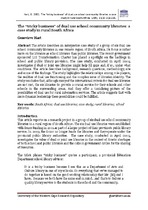The “tricky business” of dual use school community libraries: A case study in rural South Africa
Abstract
The article describes an interpretive case study of a group of six dual use school community libraries in one remote region of South Africa. Its focus is rather more on the libraries as school libraries than public libraries. The recent government sponsored LIS Transformation Charter has placed a spotlight on the backlogs in school and public library provision. The case study, conducted in April 2009, investigates if dual or joint use libraries might help fill gaps and, if so, under what conditions. The article describes background, research questions, methodology, site and some of the findings. The study highlights the relationships among role-players, the realities of dual use functioning and the complex issue of librarian identity. The study concludes that, although many of the international criteria for dual use libraries are not met, the six libraries do provide a crucial service for their schools and other schools in the surrounding areas. And they offer a tantalising picture of the possibilities of dual use for rural information services. The article suggests that with more dynamic leadership these possibilities could be fulfilled.

